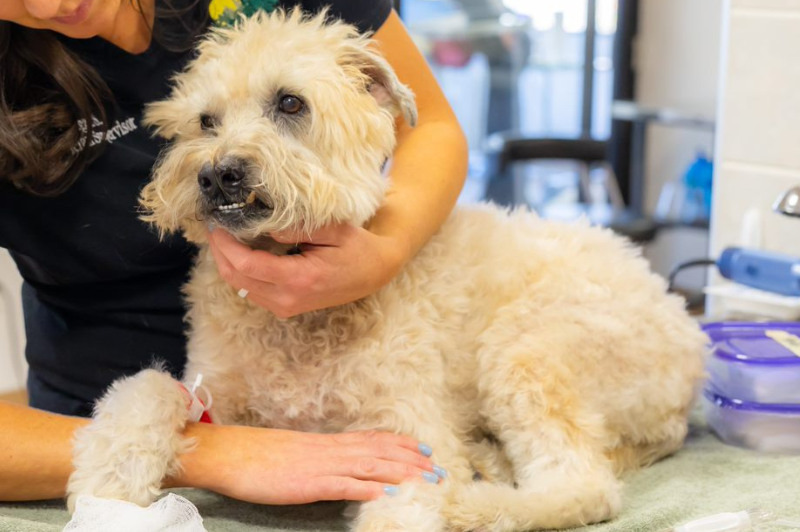
Pet Gastrointestinal Surgery in Kingston, NH
Learn more about how gastrointestinal surgery can affect your pets below.
Call us today at 📞 (603) 642-9700
Pet Gastrointestinal Surgery
An important area of veterinary internal medicine is treating gastrointestinal disorders or diseases and conditions of the digestive tract. Since many pets are exposed to the outdoors, the variety of ingestible foreign bodies and irritants is endless. Even indoor pets may ingest household items or pieces of pet toys that could do damage to their digestive tract. As your pet ages, they may develop diseases that directly or indirectly impact the digestive system.
Diseases affecting the gastrointestinal tract may include the stomach, small intestine, colon, liver, pancreas, and gall bladder. Symptoms of a gastrointestinal disease include but are not limited to:
- Vomiting
- Diarrhea
- Abdominal bloating, painfulness
- Weight loss
- Loss of appetite
Combined with indicators of pain, the above symptoms signal a possible emergency and should be taken seriously. If your pet develops any of these symptoms, we recommend you contact our office for a consultation with one of our veterinarians. A thorough exam, blood work, and diagnostic procedures, such as endoscopy or ultrasound, may be required to find the cause of your pet’s problems.
Should surgery become necessary, our highly skilled surgical team is prepared to provide the quality of care your pet deserves.
Gastrotomy is a routine and relatively safe surgical procedure. The most common indication for gastrotomy in dogs and cats is foreign body removal, particularly if objects are not amenable to endoscopic extraction because of their shape or size or because they have become fixed within the tissues. Linear foreign bodies (such as strings from roasts, sewing thread, and needles) that anchor themselves in the gastrointestinal tract usually require surgical extraction. Gastrotomy is a safe and effective way to collect full-thickness gastric biopsy samples of lesions that may be missed with endoscopic sampling. Full-thickness incisional biopsy is required to diagnose gastric carcinomas definitively.
Gastropexy is performed to prevent the development or recurrence of gastric dilatation-volvulus (GDV). GDV most often affects large and giant-breed dogs that have deep and narrow chests. Risk factors associated with the development of GDV include increasing age, ingestion of large amounts of food or water, eating rapidly, fearful temperament, and exercise after eating. Relatives of dogs with GDV appear to be at an increased risk of developing GDV. Prophylactic gastropexy is recommended in these animals. Dogs that have had GDV and do not undergo a gastropexy have recurrence rates of more than 70% and mortality rates of 80%. Gastropexy should be performed in all patients with a history of GDV. The goal of gastropexy is to create a permanent adhesion between the gastric wall and the abdominal wall. Ideally, a gastropexy should create a strong adherence, and have minimal complications.
Indications for intestinal biopsy include chronic diarrhea, vomiting, weight loss, protein-losing enteropathy, or an intestinal mass. Biopsy samples can be obtained endoscopically, percutaneously by using ultrasound guidance, or surgically during laparotomy or laparoscopy.
Many veterinarians prefer endoscopic biopsy because it is minimally invasive and permits direct visualization and sampling of the focal lesions. However, endoscopic biopsy samples can be routinely obtained only from the duodenum and colon, and lesions below the mucosa will be missed with this technique.
Surgical biopsy via an abdominal incision is performed in patients that require exploratory surgery, liver biopsy, or mass resection or in patients with intestinal lesions that cannot be reached endoscopically. It is also performed when samples from an endoscopic mucosal biopsy are not diagnostic. Obtaining a full-thickness, high-quality sample by surgical biopsy minimizes the difficulty of histologically interpreting samples from dogs with inflammatory bowel disease and other disorders.
Patients suffering from irresolvable intestinal obstruction or devitalization of a segment of the intestinal tract are among those that benefit from intestinal resection, which surgically removes the affected section and reconnects the intestine end-to-end. Intestinal resection and anastomosis are most frequently performed in dogs and cats because of foreign bodies, neoplasia, and trauma.
Get Care
© Plaistow-Kingston Animal Medical Center | Privacy Policy



